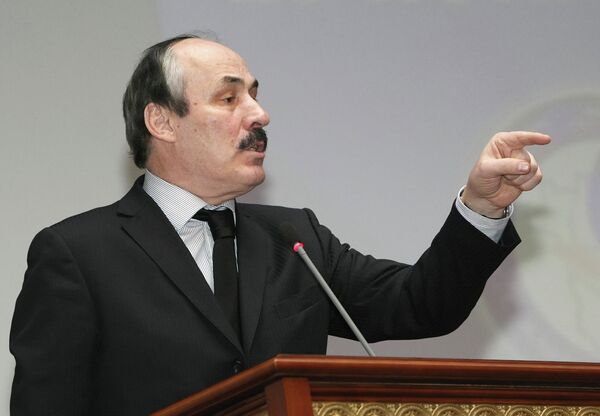MOSCOW, January 28 (RIA Novosti) – One of the most troubled regions in Russia’s restive North Caucasus got a new leader on Monday, in a Kremlin-backed reshuffle that garnered a wide range of early interpretations.
Russian President Vladimir Putin accepted the resignation of the head of Dagestan, Magomedsalam Magomedov, and appointed a veteran Dagestani politician and State Duma deputy, Ramazan Abdulatipov, as the republic’s acting head, the Kremlin press service said.
Magomedov, whose father, Magomedali, ruled Dagestan from 1994 to 2006, was appointed deputy chief of Putin’s staff.
Commenting on Magomedov’s new appointment, Putin’s press secretary Dmitry Peskov said his area of responsibility would be “determined soon.”
Magomedov, 48, became Dagestan’s leader in 2010 and his term in office was due to expire in February 2015.
No official reason has been given for his resignation; however, interpretations varied wildly – with Magomedov calling the change a promotion for his team’s “achievements in the economy, social sphere and even in the most problematic sphere – security,” while at least two analysts said the job change came about because of Magomedov’s poor results in those same areas.
Dagestan is the largest republic in the North Caucasus, with over 2.5 million people belonging to dozens of ethnic groups. It is also one of the most violence-plagued, with nearly daily attacks on state officials and deadly police manhunts for terrorists, real and perceived, claiming the lives of hundreds of local residents every year. Dagestan also served as the launch pad of many high-profile terrorist attacks, including a double suicide bombing in the Moscow metro in 2010.
Analysts suggest that poverty and underemployment – Dagestan gets more than 80 percent of its budget from federal subsidies – coupled with rampant corruption among officials, as well as a centuries-long history of rebellion against the central government in Moscow, have made Dagestan a convenient breeding ground for a virulent strain of radical Islam.
Rumors about Magomedov’s imminent resignation emerged last week.
His arrival as head of the republic was supposed to have resolved issues like its “economic development and security in the region,” as well as the development of resorts and infrastructure, said Dmitry Abzalov, a senior analyst at the private Center for Current Politics. But he made progress on the local soccer team and “things stopped there,” Abzalov told RIA Novosti, adding that the recent killings of several Muslim clerics and court officials may have been “the last straw” behind the reshuffle.
Mikhail Vinogradov, president of the Petersburg Politics Fund, a consultancy, agreed, saying that “no fundamental changes had taken place in the republic” and funding from Moscow became “more of a reason for clan wars than an impulse for economic development.”
In a tradition established in Soviet days, top state and government positions in Dagestan are distributed on an ethnic basis. The republic’s head is usually chosen from among the two largest ethnic groups, Avar and Dargin.
Moscow has religiously followed that principle to date. Magomedov, a Dargin, was preceded by Mukhu Aliyev, an Avar. Ramazan Abdulatipov, 66, is also an Avar.
Abdulatipov, who was the federal government’s point man on ethnic relations in the early 1990s, pledged to run for Dagestan’s top post in 1992 but never did. Throughout the 1990s he was elected to the State Duma and the upper chamber of the federal parliament, the Federation Council, from the republic and even briefly occupied the position of a deputy prime minister in the federal government. In 2005, Abdulatipov abandoned Russian politics, becoming an ambassador to the Central Asian country of Tajikistan. In 2009, he returned to Moscow, where he was appointed rector of a little-known arts university. Abdulatipov moved back into federal politics in 2011 when he was elected to the State Duma on the ruling United Russia party’s ticket.
Still, Abdulatipov has not lived in Dagestan for a long time and thus has no powerful local political backing in the republic, Caucasus experts said, adding that this could make him a placeholder of sorts.
Maxim Agarkov, a Caucasus analyst with the SK-Strategia think tank, suggested that Abdulatipov, who is largely seen as an “outsider” in Dagestani politics, could be a “transient figure.”
As for Magomedov’s new appointment, he agreed that it was a kind of “promotion.”
“From the Kremlin’s perspective, he may have failed, but he has failed largely due to circumstances beyond his control,” Agarkov said.
His view on Abdulatipov was shared by Nikolai Silayev, senior research associate with the Center for Caucasus Studies at the Moscow State Institute of International Relations (MGIMO).
“Abdulatipov’s appointment may be the Kremlin’s way of taking a pause by bringing in an outsider so as not to give an advantage to any of the competitors until a more lasting solution is found,” he said.


